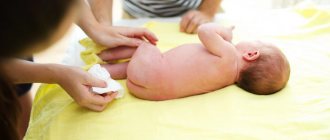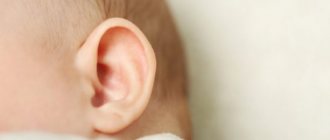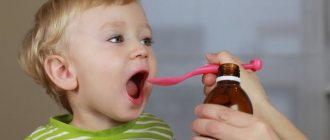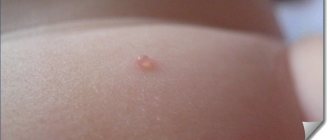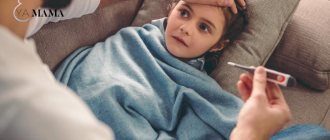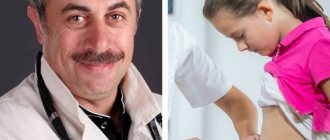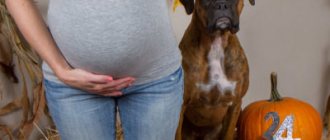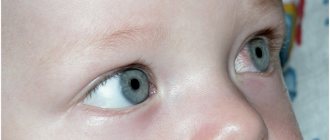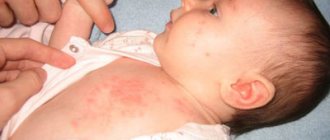Hiccups in newborns often frighten young parents, as they occur for various reasons and many do not know how to get rid of them.
However, do not worry, because this phenomenon is quite normal and natural for a small organism. It has even been proven that while still in the womb
mothers, the child begins to hiccup from the 6th week of pregnancy. Hiccups can last from a few minutes to an hour.
Basically, this condition does not require outside intervention, as it does not cause concern to the baby. But sometimes it causes anxiety in the child and prevents him from falling asleep. In such cases, it is necessary to do everything possible to rid the baby of it.
Causes
Those who are particularly concerned about how to stop hiccups should understand that it is a reflex that is not under the control of the human mind. Moreover, in some cases it does not arise out of nowhere, but as a result of some unfavorable condition, for example, hypothermia.
At the same time, hiccups can be explained by the most trivial reasons, and the most common of them is the accidental penetration of air into the stomach and esophagus, and it gets there directly with food.
From a medical point of view, hiccups are involuntary, sharp contractions of the intercostal muscles and diaphragm. In this case, a specific sound is heard, which is explained by the fact that at the moment of contraction the glottis is blocked.
Of course, those who are haunted by the question: “How to stop hiccups?” should not panic. This problem is completely solvable, and in some cases it is not necessary to resort to medical help, and it does not pose a significant threat to health. Even ordinary fear can contribute to the appearance of hiccups.
Of course, there are situations when the reflex in question is provoked by such serious pathologies as intervertebral hernia, myocardial infarction and meningitis. Here, of course, recommendations on self-treatment for those who are interested in the question “how to stop hiccups” are not needed, since professional help from a neurologist and therapist is required.
And yet, in most cases, the above problem is easily solved on its own.
How to avoid recurring hiccups
Since one of the main causes of hiccups is the rapid process of feeding, in order to prevent its recurrence, parents should instill in their child the rules of cultural eating. So, food should be chewed thoroughly until it turns into mush.
It is also recommended to avoid hypothermia, which can cause paroxysmal hiccups. The child should be dressed according to weather conditions, taking into account possible circumstances (for example, visiting a warm store or possible rain).
Hiccups in children
Very often, the physiological reflex in question occurs in children, and therefore every parent simply must know how to stop hiccups in a child.
There are many reasons for its occurrence. Most often this is normal hypothermia of the body. However, it also happens that a child begins to hiccup while laughing or crying, especially if at the same time he is telling something “excitedly”. The same reaction of the body can be expected if children are scared or experience nervous tension. What to do in such a case? Ask your child to hold his breath for a while and at the same time take 10-12 small sips of water. As an alternative, you can suggest the following method: place a glass of water on a chair and ask the child to drink the liquid through a straw, and this should be done by bending over the glass, and his hands should be clasped and held as high as possible.
Why does a child hiccup? How to get rid of hiccups, or
Hiccups are usually called a persistent, involuntarily short breath, repeated with a sharply narrowed diaphragm.
In the vast majority of cases, hiccups are a completely normal physiological phenomenon that is common to everyone, both children and adults. If hiccups are causing you discomfort, you can try to stop them, but first you need to find out the cause. From this article you will learn the main causes of hiccups in children, how to get rid of hiccups in a child, and we will also tell you what to do if a newborn has hiccups.
Vascular disorders
Many people think that hypertension can only occur in adulthood, but this is not true. Blood pressure can also increase in a child.
The cause of hypertension is impaired blood circulation in the brain. With a sharp jump in pressure, vasoconstriction occurs, which impedes blood circulation to other organs.
An attack can be triggered by sleep disturbances, weather factors, and heredity.
You can go out into the fresh air with your child. Soothing tea with chamomile or mint can relieve vascular headaches. The headache appears quickly and goes away just as quickly.
What to do if nothing helps the baby?
If your baby laughs and smiles when hiccups, then you have no reason to worry. In this case, in order for the baby to say goodbye to the problem as quickly as possible, you need to:
- Place him on his tummy and lightly pat him on the back. This is an easy way to save your child from the problem.
- If you want your baby to stop suffering from contraction of the diaphragm, make sure that there are no factors around that could frighten or irritate the child. If you notice something like this, you should immediately remove these factors, otherwise you can seriously affect the emotional state and nervous system of the baby. Such factors could be loud music, arguments, shouting, camera flashes, lightning, sudden movements, etc. The baby should be removed away from this.
- Give a hiccupping child some water to drink, but not much. You can mix warm water with a small amount of breast milk. A couple of drops of natural lemon juice, which can be placed directly under the tongue, also works.
- Put something on him if you notice that the baby is cool. Do not keep your child in a draft, and do not be with him outside for too long in cool weather.
- Just take the child in your arms and be patient - care and attention from the parents will have a beneficial effect on the baby’s condition.
Poor nutrition
Before the age of five, children experience headache attacks after eating certain foods.
Some products (sausage, sausages, processed foods) contain preservatives (nitrites), which can cause vasoconstriction.
For an adult, this dosage is insignificant, but a child’s body can react very sharply. A headache can be caused by tyramine, a substance found in yeast, cheese, and nuts.
An overdose of vitamin A and some dietary supplements that contain aspartame, sodium nitrite, sodium chloride can cause headaches.
A pregnant woman, a woman during lactation, as well as children should eat well and be attentive to the choice of foods. If a woman does not eat well while expecting a baby, the baby may suffer from headaches from the first days of life.
Usually, if there is a malnutrition in a child, in addition to a headache, an upset stomach occurs. The baby needs to be given more to drink. Green tea with the addition of mint or elderflower will help relieve an attack.
It is very important to follow a diet (more than five times a day) and avoid foods containing large amounts of carbohydrates. Nutritional supplements and vitamins should be used only as prescribed by a doctor and in strict dosages.
Prevention of hiccups
It is necessary to try to prevent the appearance of hiccups rather than deal with them later. To do this, it is worth taking preventive measures:
- Hypothermia should be avoided.
- Don't rush while eating.
- It is recommended to avoid drinking large amounts of carbonated drinks.
- It is advisable to limit yourself in drinking alcohol.
With constant hiccups, you definitely need the help of a specialist, which is not recommended to be neglected.
Article Rating
Neurological problems
The cause of headaches can be damage to the trigeminal nerve. The pain is short, sharp, sometimes accompanied by a tic, and intensifies when sneezing, coughing, or turning the head. The cause of such pain is infectious and colds, diseases of the cervical vertebrae.
Tablets for neurological pain help temporarily. Various types of heating can be used only as prescribed by a doctor. For prevention, it is necessary to monitor the baby’s posture; to support the neck, it is necessary for him to sleep on a hard bed with a bolster pillow.
Head injuries
Head injuries are very common in children. After an injury, the child may lose consciousness. But sometimes everything goes away for no apparent reason, the baby hit himself, cried and everyone forgot about it. But after some time, the child’s vision may become dark and he will begin to complain of a headache. This means that the fall did not pass without a trace and that the child needs to be shown to a doctor.
Immediately after the baby falls, you need to rub the bruise site to prevent swelling and bumps from appearing. You can apply a compress with cold water or ice to the bruise. Lay the baby down and turn off the bright lights. For several days after the injury, the child is shown quiet games. If you experience dizziness or headaches, you should call a doctor.
Why do newborns hiccup?
Article last updated: 04/04/2018 The question that worries most new mothers: why does a newborn hiccup and what to do about it? A child's hiccups begin when the diaphragm contracts and the ligaments rapidly close. Rapid closure of the ligaments is the cause of the sound of hiccups.
Since hiccups usually bother adults, many people find that they also bother babies. However, children usually do not experience discomfort. In fact, many newborns can sleep through bouts of hiccups without being disturbed, and the hiccups rarely impede or have any effect on the baby's breathing.
Source: https://ndkbsmp.ru/priznaki/ikota-u-rebenka-2-goda.html
Hiccups in a newborn
Often, new mothers have no idea how to stop hiccups in their newborn. It should be noted that in most cases this is just a harmless reaction of the baby’s body to external and internal stimuli.
Even loud music or too emotional dialogue between parents can provoke hiccups. Of course, one cannot completely exclude causes of the reflex such as fear or overeating.
Don't know how to stop hiccups in a newborn? Give him some warm water or a weakly concentrated chamomile infusion.
In order for the solution to the question of how to stop hiccups in an infant to be as effective as possible, it is very important to eliminate the true causes of the “symptom”. If, for example, a toddler is cold, then wrap him up warmer, but if he is overexcited, you need to distract him and calm him down.
Why does a child hiccup? How to get rid of hiccups, or “Go away, hiccups, from Fedot to Yakov”
Hiccups occur quite often in children. In most cases, it appears only sporadically, from time to time, but in some cases, an unpleasant symptom accompanies the child for a long time and regularly, regardless of external conditions and lifestyle - here we can talk about a serious pathology.
How to correctly determine the cause of hiccups, what effective measures to combat it exist, and how serious the consequences can be? You will read about this and much more in our article.
Possible causes of hiccups in a baby after feeding
The causes of hiccups in a baby after eating are often similar to those in an adult. A newborn may hiccup after feeding due to factors:
- When eating, the baby takes in excess air. It fills the tiny stomach and stretches the organ, putting pressure on the diaphragm, breathing is disrupted - a reflex contraction of the diaphragm occurs.
- Large portions of breast milk and formula stretch the child's stomach, which provokes the process in the child.
- Muscle strain.
- Thirst and dry mouth.
- Acute respiratory infections, helminthiases and diseases that can irritate the diaphragm.
- Immaturity of internal organs.
Often a month-old baby suffers, with a diaphragm that has not adapted to the external environment. Nasal congestion does not allow you to suck the breast correctly, and air is swallowed. Vasoconstrictor drops prescribed by a doctor will help to avoid violations.
Air
If reflex contraction of the diaphragm occurs frequently after breastfeeding, it is necessary to take a closer look at how the child eats food. If the nipple is not completely captured in the mouth, and the breast does not fit tightly to the mouth, the baby is probably gasping for air when swallowing. Air bubbles enter the baby's stomach along with food.
In a bottle-fed baby, air can get in due to the large hole in the nipple.
Binge eating
Overeating is more often the cause of the phenomenon in breastfed infants. The baby consumes a large volume of milk. Food expands the stomach. The digestive organ puts pressure on the diaphragm. The baby spits up and hiccups. The reflex does not occur once, but after each feeding if the volume of milk exceeds the norm.
In artificial dieters, the process and volume of nutrition can be controlled. By observing the norm prescribed for a newborn, the mother will prevent the phenomenon.
Factors that provoke overfeeding:
- Eating food on a schedule. The baby wants to eat before feeding time arrives. At the next meal, the baby will begin to greedily swallow the formula or milk, quickly filling the stomach.
- Large volume of breast milk from the mother. The abundance of foremilk, which often comes out with strong pressure, helps saturate the newborn before the baby gets to the healthy fatty milk.
Gases in the intestines
Gases in the intestines of a newborn cause colic, abdominal pain, and belching. The reason is the appearance of gas in the intestines if breastfeeding is due to the mother’s poor diet. If the baby is fed formula, it is recommended to replace the formula in consultation with your pediatrician.
Ways to get rid of it quickly
Sometimes, after drinking alcohol, a person develops the so-called drunken hiccups. Her attack is aggravated by general hypothermia and irritation of the digestive organs. Here's how to get rid of hiccups after drinking alcohol using improvised means.
- Drink some water. Sometimes this helps relieve unpleasant symptoms and improve digestion after a heavy meal. Water will be an even more effective means of getting rid of alcoholic hiccups if, during alcohol poisoning, you hold your breath a little and try to drink it while lying down. Sometimes you can try unusual ways to drink.
- A hiccupping person can be asked to hold their breath a little. When the blood is saturated with carbon dioxide, the respiratory center will send signals to the diaphragm to increase ventilation of the lungs.
Interesting! Baby hiccups and burps after every feeding
- Sometimes irritating the taste buds with lemon, sugar, and salt will help relieve unpleasant symptoms.
- Stretching on your toes and bending your body can also affect the causes of hiccups.
- The symptoms of hiccups in a drunk person will go away if you induce vomiting. At the same time, this will help the stomach get rid of alcohol and undigested food residues.
- If a drunk person leans forward, this will help him empty his stomach of accumulated gases. It helps if he has drunk a lot of beer.
- To stop involuntary hiccups, you need to give the person the opportunity to be distracted, to switch his attention.
Note! You can cope with hiccups if you follow all precautions. In case of severe alcohol intoxication, these methods of getting rid of this phenomenon can be life-threatening.
First aid
Hiccups are not a disease or a sign of pathology. This is a temporary phenomenon that occurs in newborns and stops after a few minutes without parental intervention. If the contraction of the diaphragm causes discomfort, frightens the newborn, or prevents the baby from falling asleep, measures can be taken.
Reflex contraction of the diaphragm after eating does not pose a threat to the health of children and rarely indicates pathology, but sometimes causes discomfort in newborns and their parents.
When a symptom occurs, young parents rarely know what to do. If the little one begins to hiccup after feeding, it is recommended to take the child in your arms, giving the body a vertical position.
The column position will allow the baby to burp excess food and air.
A light massage in the collarbone area will help remove the reflex. If the symptom does not go away, it is recommended to give warm fennel tea or boiled water.
Severe hiccups can occur in a bottle-fed baby - you need to make sure that the formula is suitable. Special medications for newborns will help eliminate bloating, flatulence and colic. Espumisan, Sub-simplex are drugs approved from the first days of life.
The phenomenon does not require treatment; if what is happening frightens the newborn, causes discomfort or interferes with sleep, the following measures can be taken:
- Give warm liquid and apply to the chest.
- Place a warm towel on the baby's belly.
- The parent can hold the baby upright until a burp occurs.
A light tummy massage helps relieve gas. Circular stroking clockwise will help the spasms subside. Dill seed tea and chamomile tea eliminate gas formation. If these methods fail, a newborn gas tube may be needed.
When to see a doctor
If contraction of the diaphragm occurs constantly after eating and lasts more than an hour, the baby cries and is restless, you should consult a doctor for advice. Only a doctor can determine the cause of the reflex.
Serious illnesses rarely provoke symptoms in an infant, but they should not be completely ruled out.
Liver pathologies, lung diseases, dysfunction of the spinal cord and brain can cause contraction of the diaphragm after eating and at any time.
The pediatrician, after listening to the parents, will refer the child for an ultrasound examination of the internal organs. An ultrasound will help identify pathologies of the baby’s gastrointestinal tract.
If the brain or spinal cord is not functioning properly, you will need to consult a neurologist.
What does Dr. Komarovsky advise?
The famous doctor Komarovsky believes that hiccups in babies are normal, and medical help is necessary if the hiccups in an infant last more than three hours, and abdominal pain is also present at the same time. The pediatrician is convinced that hypothermia is rarely the cause of hiccups; rather, adaptation to the ambient temperature occurs.
As methods to combat the phenomenon, the pediatrician recommends giving the newborn a drink of water, normalizing the level of humidity in the room, or going for a walk with the baby.
How to get rid of hiccups after alcohol using medications
If the attack does not go away after using folk remedies, you should consult a doctor. To restore the patient’s normal well-being, he prescribes medications based on diagnostic results, individual indications and contraindications. Attempts to “prescribe” medicine for yourself by going to the nearest pharmacy are fraught with dangerous complications.
Four groups of medications are used to combat hiccups:
- neuroleptics – stop involuntary contractions of the vagus nerve, normalize the functioning of the patient’s nervous system;
- muscle relaxants – relieve hypertonicity of the diaphragm muscles;
- enzymes – activate metabolic processes in the body, normalize the functioning of the gastrointestinal tract;
- antidepressants – relieve irritability and anxiety, improve general psychological condition.
To remove toxins from the patient’s body, he is prescribed sorbents: Enterosgel, Polysorb, activated carbon, etc. They help cleanse the gastrointestinal tract, restore disturbed microflora, and increase immunity. Their use is especially important in a situation where hiccups occur after a long binge.
The doctor determines the dosage of the drugs and the duration of the course.
In addition to taking them, he may prescribe related procedures, including gastric lavage, nasal catheter, inhalations for the gastrointestinal tract with carbon dioxide, etc.
If the hiccups do not go away after taking the pills, the stomach is probed and the nerve endings are blocked with novocaine. In the most severe cases, surgical intervention is indicated.
A medical examination will help identify pathologies of the gastrointestinal tract, heart, blood vessels, larynx or nervous system that lead to the occurrence of an unpleasant symptom. This means that the efforts of the doctor and the patient after diagnosis will be aimed at eliminating the cause, not the effect. The person is selected for therapy, for the entire period of which he will need to stop drinking alcohol.
Prevention
It is not difficult to prevent the occurrence of hiccups after each meal by finding out the cause of the phenomenon. Overeating, as the cause of the reflex, can be easily eliminated by reducing the portion of the formula or reducing the time the baby is put to the breast.
Before eating, it is recommended to place the baby on his stomach. It is important to adjust the position of the baby while eating so that air does not enter with breast milk. You may need to hold your baby at an angle or press him closer to your chest. The baby should grasp the areola around the nipple for greater sucking efficiency.
It is important to remain quiet during feeding so that the newborn is not distracted. Light and noise can frighten the child, distract him from eating and cause him to swallow air.
If the mother has a large amount of foremilk, it is necessary to express some of it so that the baby consumes the required amount of hindmilk. It is better to feed the baby on demand, but reduce the portion.
Mom should adjust her diet by removing gas-causing foods from her diet. Fried foods, legumes, raw fruits and vegetables are not recommended.
In babies who take food from a bottle, the cause may be the nipple. There is a wide range of anti-colic bottles and nipples with a valve on the market that prevent the baby from trapping air and limit the flow of formula. After formula, the baby may hiccup if the mother significantly exceeds the required amount of nutrition. It is contraindicated to give more food than is appropriate for the child’s age.
It is not recommended to put your baby to bed immediately after eating. It is better to hold the newborn upright for several minutes, waiting for a burp.
All newborn children, and especially babies who are less than a month old, hiccup. Often, a reflex contraction of the diaphragm begins after eating.
With age, the disorder is less likely to occur if parents follow the rules of feeding the baby, avoiding overeating. Frequent and prolonged hiccups may indicate pathology.
In this case, you need to consult a doctor to determine the cause and eliminate it in time.
A newborn baby brings joy and happy laughter to any family. New mothers are very fearful and literally do not take their eyes off the baby.
They don't sleep at night, looking closely at their baby, and try to study their baby down to the last mole. However, from time to time, a mother notices with fear that her child is shaking convulsively, hiccupping and crying.
Frightened, she rushes to look for information - why does the child hiccup often and what does it mean?
Nature of hiccups
In order to understand the causes of children's hiccups, it is necessary to remember why this process happens in adults and what the consequences are. We often hiccup, but it doesn’t last long, so sometimes we don’t notice the beginning and end of the process, especially if we’re passionate about something at that moment. Hiccups, in fact, are convulsive contractions of the diaphragm that occur as a result of irritating factors.
Causes of hiccups can be:
• Binge eating. Alas, this is the most common irritant that causes attacks.
• Cooling. Cold is a fairly common cause of hiccups.
• Fright. Yes, yes, fear can also cause seizures.
• Swallowing air. Accidentally swallowed air can often cause this trouble.
However, everyone knows that hiccups are a fairly quickly passing thing, disappearing in just a few minutes.
Hiccups in children
The answer to the question why an infant often hiccups lies on the surface: for the same reasons as you and I. Attacks occur from rich food, from hypothermia, from air, etc. The main thing is to understand what influences the occurrence of this trouble.
For example, swallowing air may be caused by an irregularly shaped nipple on the bottle through which the baby receives food. Or the reason may be the baby’s incorrect position during feeding. These 2 reasons happen most often, the elimination of which will save mommy from such problems.
Sometimes hiccups can occur after giving your baby a bath. Usually, in such cases, new mothers for a long time cannot understand what is the matter, if the child is a week old and often hiccups after bathing. The problem is that babies have very delicate skin, and even a slight change in air temperature can make them shudder in bouts of hiccups.
on how to deal with hiccups
Source: https://poliklinika73.ru/simptomatika/ikota-i-rvota-u-rebenka.html
Hiccups after drinking alcohol
Often the forced contraction reflex of the diaphragm occurs after drinking alcohol. If a person is faced with such a problem, then it is better to get rid of it in the fresh air. So, how to stop hiccups after drinking alcohol? First of all, try to provoke vomiting using your fingers, then alternate deep breaths followed by holding your breath for 5-10 seconds.
Another solution to the problem is to eat a slice of lemon without sugar or a slice of bread smeared with mustard. Bitter and sour foods prevent erratic contraction of the diaphragm.
Prolonged hiccups
But what to do in a situation where hiccups do not go away for a long time? Here, of course, more radical measures are required. For example, it wouldn’t hurt to saturate the blood with carbon dioxide; you can do this by breathing a little with your open mouth into a paper bag.
If contractions of the diaphragm are a symptom of any ailment, then drug treatment cannot be avoided, and the person should seek help from a doctor. As a rule, drugs such as Cerucal, Finlepsin, and Perinorm are prescribed.
To prevent hiccups from bothering you, follow simple rules: chew your food slowly, and do not be distracted by anything other than food. Drink the liquid in small sips, do not get too cold and control the water balance in the body.
